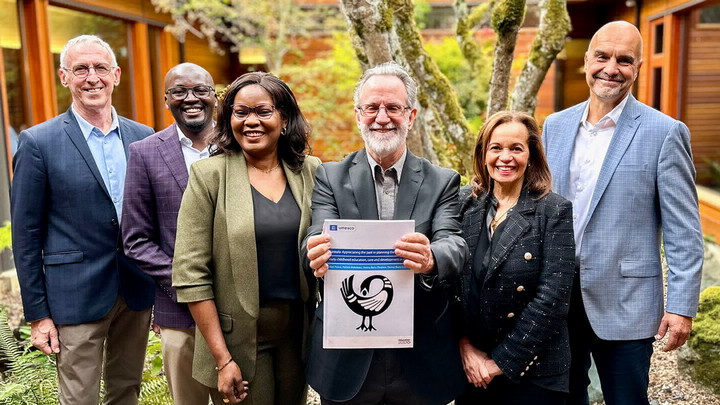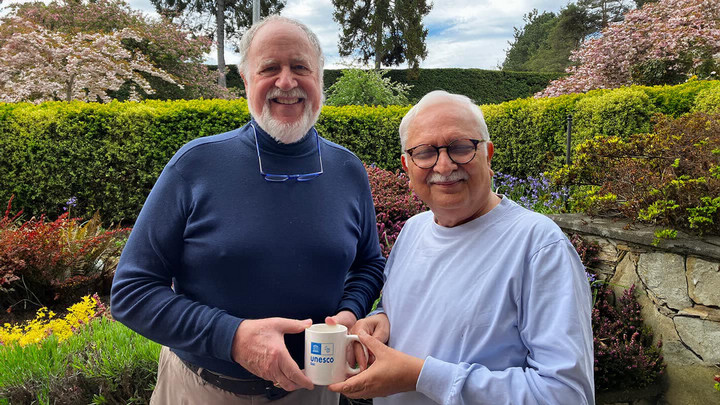UNESCO: bringing people together through education, culture and science Impact and resilience in local communities worldwide
March 13, 2025
The United Nations Education, Scientific and Cultural Organization (UNESCO) chairs program “mobilizes expertise of higher education and research institutions to address the interdependent challenges of today’s increasingly complex world.”
Of 40 UNESCO chairs in Canada, UVic hosts two, both housed in the Centre for Global Studies. Recently, we caught up with the local chairholders to learn what they’ve been doing and what’s next.
Look to the past, plan for the future

Alan Pence, professor emeritus in UVic’s School of Child and Youth Care, has held the UNESCO Chair for Early Childhood Education, Care and Development since 2008, but he doesn’t spend his time just sitting in it.
He developed a series of African International Early Childhood Development Conferences. The 2009 event in Dakar, for example, drew more than 600 participants from 40 sub-Saharan Africa countries, including 140-plus government ministers. Since 2008, the African Scholars Workshop series has brought together more than 60 scholars from 22 countries.
And while Pence has been advancing the research and engagement, he's also been adapting the foundation and future of the chair itself.
“By 2050, 40 per cent of the world’s children will live in Africa,” he points out, “however, studies of the child development literature noted that less than five per cent of that literature included Majority World authors and samples—and less than one per cent were African authors. Clearly, the literature is dramatically incomplete.”
So he began to look for a prolific early childhood researcher on the continent, and Hasina Banu Ebrahim’s name quickly surfaced. In 2017, the research professor from the University of South Africa joined Pence as co-chair.
Next, Pence turned his attention to francophone Africa in order to include and reach the 320 million people in 26 countries where French is either an official language or widely spoken. At the chair’s third renewal in 2021, Oumar Barry of the Université Cheikh Anta Diop in Senegal joined to make the chair a triumvirate.
With the tri-chair structure, Pence says, visibility for the work is growing, reaching more people with more impacts than ever before. In 2023, UNESCO published Sankofa: Appreciating the past in planning the future of early childhood education, care and development in Africa. The editors are Pence, Banu Ebrahim and Barry, along with UVic PhD alumnus Patrick Makokoro of Zimbabwe. Of the 34 authors, 85 per cent are African citizens. The content ranges from country-specific stories through historical and transformative events to “building forward better.”
“Sankofa seeks to address long-standing concerns and inequities regarding the missing voices, data and knowledge in this field from Africa,” the introduction states. “It aims to tell African stories and experiences through their own, contextualized understandings of education for their youngest citizens.
“By broadening and decolonizing the discourse on this crucial period of every child’s life, it sets a way forward for Africa’s future generations.”
Pence sums up his own vision. “It’s important to do this work, and it’s more important that it continues on,” he says. “I hope that by the next renewal in 2029, the UNESCO Chair for Early Childhood Education, Care and Development will have 100 per cent African leadership.”
Connecting for knowledge democracy

Since 2012, Budd Hall, professor emeritus in the School of Public Administration at UVic, and Rajesh Tandon, founder and president of Participatory Research in Asia, have jointly held the UNESCO Chair in Community-Based Research and Social Responsibility in Higher Education.
During the first five years, they conducted two pivotal international research projects to deeply understand the global landscape of community-university research partnerships and participatory research training. Their findings identified a gap: university courses often lacked community engagement and community-led programs lacked theoretical foundations, so Tandon and Hall collaborated with global partners to devise a robust pedagogical model.
The outcome, Knowledge for Change (K4C) Global Consortium for Training in Community-Based Participatory Research, continues to forge formal partnerships between community organizations and higher education institutions, with a shared commitment to providing holistic learning experiences aligned with the United Nations Sustainable Development Goals. The consortium was launched with five K4C Hubs in four countries and has grown to 28 hubs in 16 countries. 160 community-based research mentors have been trained who have in turn trained over 9,000 young researchers.
“Rajesh and I are encouraged by one segment of the global research environment,” Hall says. “Our work in knowledge democracy and diversity, and actionable knowledge related to critical issues such as climate change, has never had more attention.”
For example, they are regularly included in important research funding spaces such as the Results First Initiative led by the PEW Charitable Trust; the Global Research Council; the Research on Research Joint Initiative of international funding agencies including the Canadian funding agencies Social Sciences and Humanities Research Council, Canadian Institutes of Health Research and Michael Smith Health Research BC; UK Research and Innovation for Everyone’s community research initiative; and more.
“Between Knowledge for Change consortium and our DECODE project, with its gender and decolonial lens, we are working with 40 or 50 universities,” Hall says. “In India alone, Rajesh is leading the national knowledge democracy work on behalf of the government’s higher education granting council.”
The pair also played a key role in the language of the 2022 UNESCO Recommendation on Open Science, the first international standard-setting instrument on open science, aiming to make scientific research accessible to everyone for the benefit of scientists and society.
And the community has recognized the significance of their work as well. Even before the creation of their chair, UVic honoured Tandon with an honorary Doctor of Laws degree for his pioneering work in civic engagement, governance and community-based research. And Hall’s 2022 Officer of the Order of Canada citation leads with his contributions to community-based research.
“The scientific world is awakening to the existence of a vast array of ways of knowing,” says Hall, “from the ancestral knowledges of Indigenous Peoples to the knowledges of the lived experience of those who are making their communities better. We are honoured to play a role in the building of the knowledge democracy movement.”
Rachel Goldsworthy
